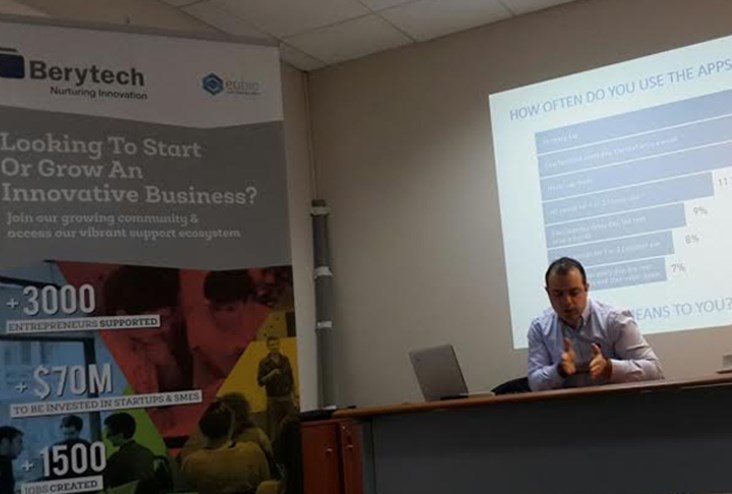
For “appreneurs” (entrepreneurs in the digital ecosystem focused on app development), the life of a mobile app starts with a good idea, and is followed by pitching for investors. With the growing revenues of apps, appreneurs are more likely than even to obtain funding. However, the road ahead is a tricky one.
The key is sustainability - after all, nine in ten startups fail, even with investment. So how do you put all the odds on your side and guarantee you will succeed in the app business?
The Berytech offices in Beirut hosted a talk by Mario Hachem, co-founder and CEO of Tedmob, to provide insights that could help appreneurs come up with an appropriate answer to that question.
Tedmob is a provider and developer of advanced mobile applications, revenue-generating solutions, and innovative digital services to startups and entrepreneurs. Building on his twelve-year experience in app monetization and marketing, Hachem stressed the need for appreneurs to market their apps and optimize promotional strategies and revenue generation.
Here are 6 key insights we gathered from this talk:
1. Achieve “stickiness”
After securing funding for their app idea, appreneurs are far from done. In preparation for the execution stage, they ought to delve into a much-needed brainstorming phase - for no less than a month - to know all apps and features in the market.
“So many apps are downloaded, and opened for the first and last time! And here lies the magic, or lack of it: how to get people to revisit the app. Careful study is crucial in understanding users' requirements and reflect them in the description of the app to meet expectations,” said Hachem.
According to him, savvy appreneurs' best bet is to arm their team with data, and surround themselves with tech consultants. Designs are trickier than ever; for example, users are not fans of more than 3 clicks to find out what their app is all about. Failing to consider this factor - which is now an industry standard - can doom the entire project.
2. Have a sound monetization scheme
The fact is that even problem-solving apps do not guarantee profit. A proper monetization strategy is essential, and multiple scenarios have to be adapted and tested before launch.
Hachem advises against trying to save money on the development stage by choosing the rather “lazy” option of outsourcing. There is also danger in fully relying on investors who lack the appropriate technical or industry knowledge.
Appreneurs need to form a team within the company or get outside experts dedicated to a monetization plan that includes testing issues and solutions to avoid pitfalls in the future.
Hachem said this should happen from day one: “If you want to generate income after one year, you have to plan and create subscription services with operators. A monetization strategy helps appreneurs avoid situations where they have usable app data, but no one to buy it.”
3. Design a relevant visual identity
The mobile culture is a visual culture par excellence. This should be considered across all user interfaces of an app.
For example, using app screen shots are an important feature to explain what the app is about and what it does. He also calls for snappy introductory videos (usually 30-45 seconds long) that make the app stand out from others.
And there is no need to put the company logo on app icons. He gives gaming apps as an example where the face of the hero is what's on the app icon. “Just make sure it is relevant, simple, and on message.”
4. Talk the right talk
When telling the story of their app, appreneurs need to stay away from boastful and hyperbolic language about how “great” it is. Instead, they need an attractive story that people can relate to.
Using a creative, entertaining language in press releases or blog posts will help create a positive buzz among audiences. The same metrics need to be applied in the description on the app store. Appreneurs are also encouraged to be open about comparing their product to successful and famous app names.
The language factor is equally important in communicating user ratings: “Send abrupt, smart-worded messages to remind people of your rating. Your popups can even be humorous - or thankful to the ratings.”
At the same time, it is important not to neglect bad reviews: “Listen to them, for they can become your app ambassadors.”
5. Focus on marketing, not development The 70:30 formula
Hachem advises appreneurs to deal with promotion and marketing first, and leave the technical side of the app for developers. “Don’t take any money from anybody if you will not spend 70% of it on marketing,” he said. this is something he calls the “70-30 formula”.
Once the idea for an app is clear, appreneurs should strike an agreement with a development company they trust for a year. They should be the owners of the code, ask for weekly or regular reports, and make sure everything is on track, applying penalties for delays.
Hachem calls this his “biggest advice”, and recommends allocating as much budget as possible to the marketing strategy and campaign. This includes e-shots, SMS notifications, cinema, TV, and radio ads, as well as celebrity and third-party endorsements (such as specialized journalists and bloggers).
“You need those downloads. The easiest way to get one million people paying is to get one billion people using,” he said.
6. Stay in the game with your A-game
So you’ve made use of all this advice and launched your app with success. Mission accomplished? No. There is a constant need for promoting and monitoring your app.
For example, he said appreneurs should apply to as many competitions as possible - and there are plenty - for the sake of gaining press coverage and help increase the number of downloads.
Hachem also encourages appreneurs to submit their apps to various sites and stores such as 148apps, AppStoreApp, and AppAdvice to generate more traction and insights into new markets.
Another important piece of advice for post-launching and expansion is localization/internationalization. Hachem mentioned studies which have shown that if you add language options to an app, you can significantly increase the number of downloads. Localizing for specific markets (even on the level of dialects for different Arabic-speaking countries) also creates an advantage.
See related:
The App Opportunity for Businesses in MENA - Analysis
MENA Sees Consistently Healthy App Spending
MENA Hungry for Mobile Apps - ArabNet App Trends Report
The Top App Categories in the MENA – ArabNet App Trends Report
Latest Business
Intelligence Report














